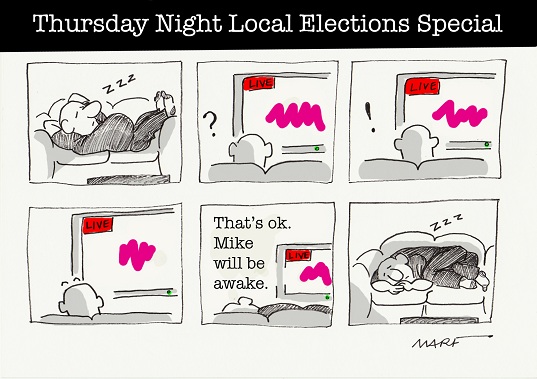The PB Local Elections Special with a chance of a gain for Ukip

Tonight’s Harry Hayfield local by election preview
Aldwick East on Arun (Con Defence)
Last Local Election (2011): Con 48, Lib Dem 4, Lab 3, Ind 1 (Con majority of 40)
Last Election Result (2011): Con 2,536 (64%) Lib Dem 622 (16%) UKIP 283 (7%) Ind 268 (7%) Lab 264 (7%)
Bognor Regis (given it’s title in recognition of the Monarch) is the sort of town that if a Conservative didn’t win shockwaves would ripple across the entire country. Even in the 1997 Labour landslide, Nick Gibb was elected as the Conservative MP with a majority of 7,321 (16%) over Labour and since the local elections in 2003, the Conservative overall majority in Arun has tripled. And yet (as we have seen in other areas where there is a huge one party majority) there is a tendency for the electorate to show the governing party that they should never take their support for granted. So with UKIP polling at record highs and Arun, a Conservative bastion, can UKIP finally manage to achieve what has so far been impossible for them and gain a seat at a local by-election?
Â
Foxhills on Runnymede (Con Defence)
Last Local Election (2012): Con 36, Rates 6 (Con majority of 30)
Last Election Result (2012): Con 581 (47%) UKIP 284 (23%) Lab 274 (22%) Lib Dem 107 (9%)
Previous Election Result (2011): Con 993 (55%) UKIP 325 (18%) Lab 317 (18%) Lib Dem 155 (9%)
Previous Election Result (2010): Con 1,587 (56%) Lib Dem 583 (21%) Lab 367 (13%) UKIP 305 (11%)
Runnymede is famous in the history of England as the site where the Magna Carta (or Grand / Great Charter) was signed in 1215 limiting the powers of King John (who was already less popular than the average king having managed to insult everyone from the princes of Ireland to the Welsh) and establishing the foundation of British democracy so how fitting would it be if (assuming that they had no luck in Arun) that Runnymede could see UKIP’s first gain at a local by-election. Unlike Arun where UKIP are a distant third, in Runnymede, they have slowly been climbing in the polls from 11% in 2010 (when a UKIP candidate polled 7% in the Runnymede constituency) to 23% (and beating Labour) in last year’s local elections. However with Labour close behind, could the opposition’s vote be split and allow the Conservatives to retain the seat?
Gospel Oak on Camden (Lab Defence)
Last Local Election (2010): Lab 30, Lib Dem 10, Con 10, Green 1 (Lab majority of 9)
Last Election Result (2010): Lab 5,805 (40%) Con 4,070 (28%) Lib Dem 2,973 (20%) Green 1,745 (12%)
A lot has happened in London since the local elections in 2010. Boris Johnson was re-elected Mayor and the London Assembly saw Labour make impressive gains with the Liberal Democrats being knocked for twelve by falling behind the Greens both in the mayoral election and the regional list vote. For the electors of Gospel Oak, there has been another change as well. On Sunday, during a debate on the so called secret courts, Jo Shaw resigned her membership of the Liberal Democrats stating that she could not be a member of a party that backed the idea (proven when 39 of the MP’s voted in favour of the plan in a recent Parliamentary vote). Jo Shaw was the Liberal Democrat candidate at the general election in the Holborn and St. Pancras constituency that Gospel Oak is part of suggesting that some Liberal Democrats are having a problem with the way that the parliamentary party is behaving and therefore may decide to take their frustrations out on the party by not supporting their candidate and given the current climate that does rather suggest a massive Labour hold.
Royton South on Oldham (Lab Defence)
Last Local Election (2012): Lab 43, Lib Dem 14, Con 2 (Lab majority of 27)
Last Election Result (2012): Lab 1,566 (70%) Con 544 (24%) Lib Dem 134 (6%)
Previous Election Result (2011): Lab 1,932 (65%) Con 776 (26%) Lib Dem 257 (9%)
Previous Election Result (2010): Lab 2,047 (41%) Lib Dem 1,484 (30%) Con 1,416 (28%) Others 61 (1%)
Oldham tells the tale of the Lib Dems and what has happened to them in a nutshell. In 2003, Oldham was a Labour controlled council (Lab 33, Lib Dem 25, Con 2) and despite the problems that Labour were experiencing with people saying that the invasion of Iraq was wrong that year’s local elections were not too bad. Oldham is a council that votes every year and as such it is possible to track the parties performance as time goes on. The 2004 local elections saw not much change (One net Lab loss to Ind), 2006 also saw no real change (One net Lab loss to Lib Dem) however the writing was on the wall and in 2007 the Conservatives made two net gains from both Lab and Lib Dem and the council fell into No Overall Control. In 2008, the Lib Dems and Conservatives pounced making Labour lose eight seats (four to Con and four to Lib Dem) and allowing the Liberal Democrats to gain control of the council. However, in 2010, as the voters who had deserted them during the last set of elections came back, Labour started their advance. Five Lab gains (three from Lib Dem, two from Con) put the council back into NOC, and in 2011, Labour turned the knife racking up seven net gains (six from Lib Dem and one from Con) to regain the council, before twisting it even more and making nine net gains (seven from Lib Dem and two from Con) to end up with a majority of 27 and the Lib Dems at their lowest number of councillors on Oldham since 2003.